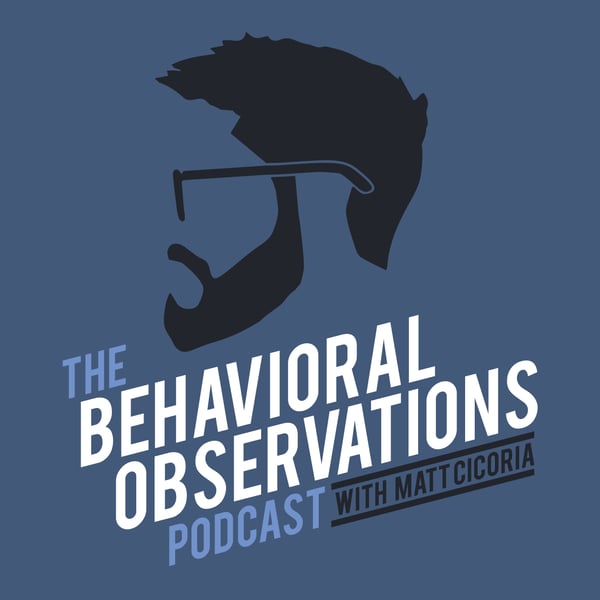26: Wendy Machalicek talks Telemedicine
The Behavioral Observations Podcast with Matt Cicoria
Matt Cicoria
4.8 • 648 Ratings
🗓️ 14 May 2017
⏱️ 61 minutes
🧾️ Download transcript
Summary
I sometimes joke around with folks that we Behavior Analysts are perhaps the only people who think nothing of driving one hour to do two hours of work. While that’s a little bit of an exaggeration, I find that it’s not entirely off the mark either. Obviously there are only so many hours in the day, and from both a clinical and financial perspective, these practices lead to a lot of waste. What if there was a way to leverage existing technologies to reduce travel-related barriers to providing clinical services? Well, it turns out that the answer to this question already exists, and other helping professions have been using technology to both expand services and operate more efficiently. In episode 26 of The Behavioral Observations Podcast, I chat with Dr. Wendy Machalicek, BCBA-D, who is an Associate Professor of Special Education at The University of Oregon, about using technology to provide behavior analytic services to families in rural areas. This practice goes by a few different names, but is often referred to as Telemedicine or Telehealth. Wendy discusses some of her research in this area as well as walks us through how to conceptualize the use of technology in our own work. So does that mean you can fire up Skype and start consulting with clients? Not so fast… as I learned from this conversation there are tons of technical and ethical details that have the potential to be inadvertently overlooked, including things like encryption of data, consent/assent in terms of working with adults, privacy/confidentiality of anyone who can view/hear the client-analyst exchanges, etc... Wendy also the behavior-analytic, “scene,” in Oregon and provided some helpful advice for newbies to the field (though I found her thoughts helpful for older practitioners like myself too!). We covered a lot in this episode, so here are some links of the things that were mentioned: • VSee HIPAA compliant video conferencing software • Bluetooth headsets • External web cameras • Swivl remote camera gear • The American Telemedicine Association • The APA Guidelines for practice re: Telehealth Speaking of making life more convenient, if you’re on the road a lot but need Continuing Education, check out the CE page. That’s right, you can now earn BACB Type 2 CE’s by listening to selected podcasts, and answering a few questions. Right now CE credits are available for topics such as Functional Assessment and Function-Based Interventions, The Ethics of Self-Care, and Behavioral Economics. Again, visit the CE page for more details.
Transcript
Click on a timestamp to play from that location
| 0:00.0 | This is the Behavioral Observations podcast with Matt Secoria, session number 26. |
| 0:12.1 | Welcome to the Behavioral Observations podcast, stimulating talk for today's behavior analysts. |
| 0:19.7 | Now here's your host, Matt Sequoria. |
| 0:24.7 | Hey everybody, it's Matt Sequoory, and I'm really excited to bring session 26 of the Behavioral |
| 0:29.3 | Observations podcast to you. You know, when I talk with people who aren't behavior analysts, |
| 0:35.4 | they're sometimes surprised to learn how far we have to |
| 0:37.7 | drive, you know, whether that we're living in an urban setting and just have to negotiate traffic |
| 0:42.4 | or we're in rural areas like I am, you've got to go all over the place to see clients and visit |
| 0:47.1 | schools and things like that. You know, oftentimes we would think nothing about driving an hour |
| 0:52.3 | to do two hours of consultation or to work with someone or whatever. |
| 0:56.8 | And while that example might be a tad bit extreme, it's not too far off the mark. |
| 1:02.0 | I'm sure many members of the audience who are listening right now can nod their head that they've done something like that before. |
| 1:10.1 | But what if there was a way to leverage |
| 1:12.7 | existing technologies to reduce travel-related barriers to providing these types of clinical services? |
| 1:18.6 | Well, it turns out that other professions, other helping professions, that is, have already |
| 1:23.1 | answered these questions. You know, this is a growing field of what's called telemedicine or telehealth. |
| 1:29.1 | And in this episode, I'm really psyched to be joined by Dr. Wendy Mihalichek, who shares a lot of |
| 1:35.8 | her research in this area and really dives deep into all the things you need to know if this is |
| 1:41.4 | something you're considering doing. So we talk about all sorts of kind of, |
| 1:46.5 | I guess, practical considerations. And I'm going to make a confession in advance. I kind of geeked |
| 1:52.3 | out a little bit, you know. I mean, having a podcast, you know, you have to have gear to do that |
| 1:57.1 | and stuff like that. So I kind of went a little bit overboard. I tried to restrain myself a little |
... |
Please login to see the full transcript.
Disclaimer: The podcast and artwork embedded on this page are from Matt Cicoria, and are the property of its owner and not affiliated with or endorsed by Tapesearch.
Generated transcripts are the property of Matt Cicoria and are distributed freely under the Fair Use doctrine. Transcripts generated by Tapesearch are not guaranteed to be accurate.
Copyright © Tapesearch 2025.

